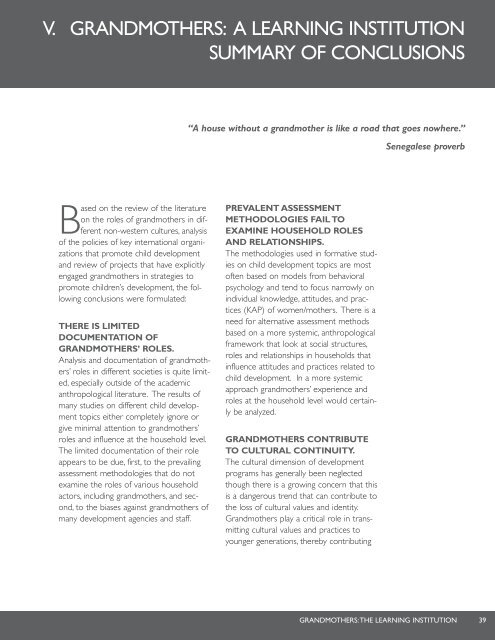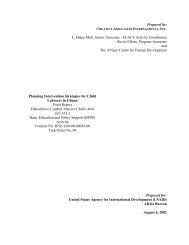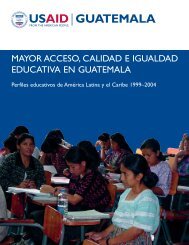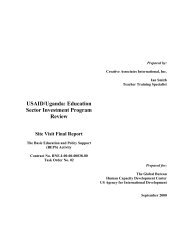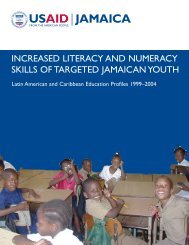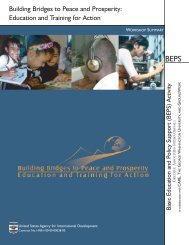Grandmothers: A Learning Institution - Basic Education and Policy ...
Grandmothers: A Learning Institution - Basic Education and Policy ...
Grandmothers: A Learning Institution - Basic Education and Policy ...
- No tags were found...
You also want an ePaper? Increase the reach of your titles
YUMPU automatically turns print PDFs into web optimized ePapers that Google loves.
V. GRANDMOTHERS: A LEARNING INSTITUTIONSUMMARY OF CONCLUSIONS“A house without a gr<strong>and</strong>mother is like a road that goes nowhere.”Senegalese proverbBased on the review of the literatureon the roles of gr<strong>and</strong>mothers in differentnon-western cultures, analysisof the policies of key international organizationsthat promote child development<strong>and</strong> review of projects that have explicitlyengaged gr<strong>and</strong>mothers in strategies topromote children’s development, the followingconclusions were formulated:THERE IS LIMITEDDOCUMENTATION OFGRANDMOTHERS’ ROLES.Analysis <strong>and</strong> documentation of gr<strong>and</strong>mothers’roles in different societies is quite limited,especially outside of the academicanthropological literature. The results ofmany studies on different child developmenttopics either completely ignore orgive minimal attention to gr<strong>and</strong>mothers’roles <strong>and</strong> influence at the household level.The limited documentation of their roleappears to be due, first, to the prevailingassessment methodologies that do notexamine the roles of various householdactors, including gr<strong>and</strong>mothers, <strong>and</strong> second,to the biases against gr<strong>and</strong>mothers ofmany development agencies <strong>and</strong> staff.PREVALENT ASSESSMENTMETHODOLOGIES FAIL TOEXAMINE HOUSEHOLD ROLESAND RELATIONSHIPS.The methodologies used in formative studieson child development topics are mostoften based on models from behavioralpsychology <strong>and</strong> tend to focus narrowly onindividual knowledge, attitudes, <strong>and</strong> practices(KAP) of women/mothers. There is aneed for alternative assessment methodsbased on a more systemic, anthropologicalframework that look at social structures,roles <strong>and</strong> relationships in households thatinfluence attitudes <strong>and</strong> practices related tochild development. In a more systemicapproach gr<strong>and</strong>mothers’ experience <strong>and</strong>roles at the household level would certainlybe analyzed.GRANDMOTHERS CONTRIBUTETO CULTURAL CONTINUITY.The cultural dimension of developmentprograms has generally been neglectedthough there is a growing concern that thisis a dangerous trend that can contribute tothe loss of cultural values <strong>and</strong> identity.<strong>Gr<strong>and</strong>mothers</strong> play a critical role in transmittingcultural values <strong>and</strong> practices toyounger generations, thereby contributingGRANDMOTHERS:THE LEARNING INSTITUTION39


